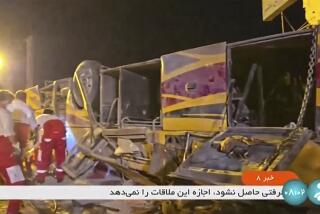Suicide bombing kills at least 40 Shiite pilgrims
- Share via
BAGHDAD — A suicide bomber blew himself up among Shiite Muslim pilgrims at a crowded rest stop Sunday, part of an eruption of sectarian violence that killed at least 43 people, injured 148 and tarnished rites marking one of Shiite Islam’s holiest holidays.
The bloodshed will put pressure on a truce declared by a powerful Shiite militia in August. On Friday, anti-American cleric Muqtada Sadr renewed the cease-fire for six months in a move U.S. and Iraqi officials hope will reinforce recent security gains.
But patience with the cease-fire is wearing thin among Sadr’s followers, who complain that their opponents are using it to target them.
The bombing was one of at least three attacks Sunday on the throngs of Shiites who were walking to the southern shrine city of Karbala to commemorate the religious holiday of Arbaeen.
The weeklong pilgrimage, which culminates Thursday, marks the end of 40 days of mourning after the anniversary of the 7th century martyrdom of Imam Hussein, a grandson of the prophet Muhammad and the spiritual linchpin of the Shiite faith.
Such pilgrimages were banned under Saddam Hussein’s Sunni Arab regime. Since the late dictator was toppled in 2003, they have become an expression of the dominance of Iraq’s Shiite majority -- and a frequent target for Sunni insurgents.
More than 200 people were killed last year in a series of attacks as the flag-carrying masses made their way to Karbala. Encouraged by the recent drop in violence, millions are expected to converge in the holy city this year, many of them walking more than 100 miles to get there.
Residents along the route set up tents offering the pilgrims food, water and places to rest. It was at one of these stations, along a highway between the towns of Iskandariya and Musayyib south of Baghdad, that the suicide attacker struck Sunday.
Iraqi security officials and witnesses said a man with explosives hidden under a black leather jacket blew himself up after mingling with the pilgrims. At least 40 people were killed and 105 wounded, said Dr. Ahmed Ajrish, an official at the Babil provincial health directorate.
Fadil Talib, a civil servant, was in the crowd when the explosion happened.
“All I remember is a loud roar of ‘God is great,’ followed by a loud blast,” Talib said from a hospital bed in nearby Hillah. “The pressure was so intense that all the sounds were muted. I saw flesh fluttering like feathers in the air. . . . I fainted and didn’t come to until here in the hospital.”
Hours after the blast, ambulances continued to arrive at three regional hospitals with the dead and wounded. Staffers battled to cope with the flood of casualties.
Talib lay on his side, squeezing a nurse’s hand as a doctor stitched a gash in the back of his head. The hospital was running out of anesthetic and other supplies, the doctor said.
“There is no army or police!” Talib screamed in pain. “This is a failed security plan.”
Earlier Sunday, police said a roadside bomb exploded near pilgrims walking along a highway through the southern Baghdad district of Dora, where fighting erupted between the mostly Sunni Arab residents and Shiite militiamen accompanying the procession.
Half an hour later, suspected Sunni assailants tossed grenades at the pilgrims from a bridge spanning the highway, police said.
The violence in Dora left at least three civilians dead and 43 injured, most of them pilgrims, according to Iraqi security and hospital officials. Three members of the Shiite-dominated national police force were among the wounded, they said.
The U.S. military did not confirm the roadside bombing, but put the casualty toll from the grenade attack at one civilian killed and 17 injured. An Iraqi soldier was mildly wounded while responding to the situation, the military said in a statement. It made no mention of a bomb or sectarian clashes.
Such discrepancies are common in the immediate aftermath of attacks, and it was not immediately possible to reconcile the accounts.
To protect pilgrims from further violence, the U.S. military said Iraqi security forces were increasing the number of checkpoints and joint patrols with the Americans along the route to Karbala. Vehicle traffic is also being restricted in some areas and observation posts have been set up, the statement said.
Some Sunnis in Dora said the Shiite pilgrims provoked Sunday’s fighting by chanting, “Damn the Sunnis, the highway is now ours,” as they marched through the area the previous day.
One leader of a U.S.-backed local Sunni guard force in Dora said in an interview that Iraqi soldiers stationed in the area clashed with Sunnis who went to complain to them about the taunting.
“The army forces overreacted and had a serious brawl with the local residents,” said the leader, who spoke on condition of anonymity. “Army forces started shooting randomly at locals.”
The next morning, he said, pilgrims arrived accompanied by members of Sadr’s Mahdi Army militia. Clashes broke out soon afterward, he said.
“It’s a big disgrace for Iraqis to kill each other like this,” said the Sunni guard leader. “We worked hard to secure this area.”
Two U.S. soldiers were killed in Baghdad on Sunday, one by small-arms fire and the other in a roadside bombing, the military said.
The deaths brought to 3,972 the number of American military personnel killed since the start of the war in March 2003, according to the independent website icasualties.org
--
Times staff writers Borzou Daragahi and Caesar Ahmed in Baghdad, special correspondent Saad Fakhrildeen in Najaf and special correspondents in Baghdad and Hillah contributed to this report.
More to Read
Sign up for Essential California
The most important California stories and recommendations in your inbox every morning.
You may occasionally receive promotional content from the Los Angeles Times.













